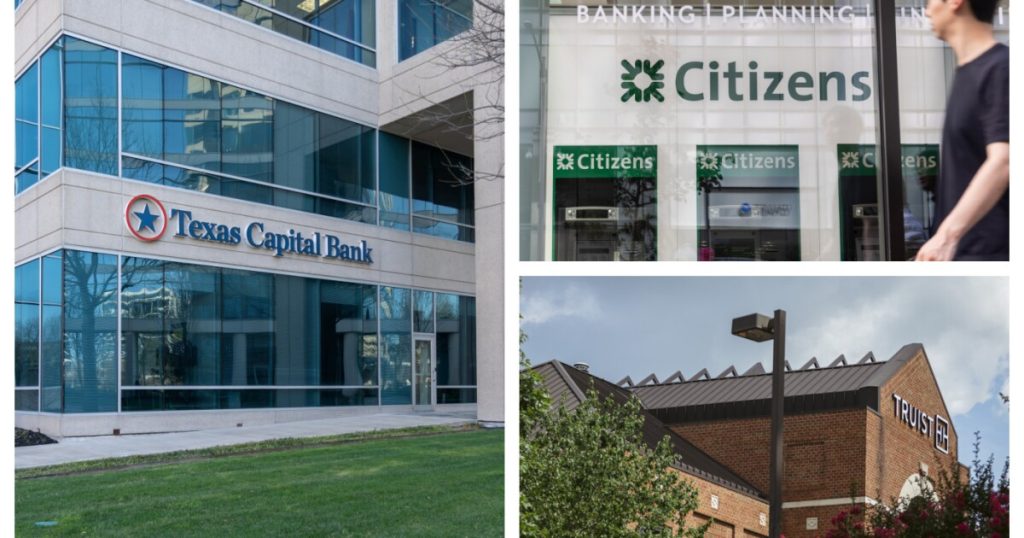A handful of U.S. banks are facing heightened shareholder dissatisfaction over executive pay, pressuring them either to further defend their compensation programs or make changes.
In recent weeks, the say-on-pay resolutions presented by
At Texas Capital Bancshares, the say-on-pay measure failed, as less than 50% of shareholders showed support. The 47%-53% vote came in spite of the bank’s efforts last fall to address investors’ concerns about one-time equity awards to certain named executives and an amended employment contract for Chairman and CEO Rob Holmes.
Goldman Sachs’ shareholders also recently registered a steep decline in support for executive compensation. The Wall Street giant’s say-on-pay measure
At all five banks, at least one proxy advisory firm
Banks that receive dwindling support will want to get to work on talking to investors and making the case that what they pay their CEO and the rest of the C-suite is worth it, Alan Johnson, managing director at Johnson Associates, a compensation consulting firm that works with some of the nation’s largest banks, told American Banker. And they should move fast or risk losing more support next year, he added.
“You’re going to take a really serious look at your program, especially if you’ve failed the vote or gotten really close, and you’re going to have to make some changes,” Johnson said. The reason for the lower support is sometimes “pretty straightforward, and sometimes it’s more arbitrary,” he said.
Banks’ say-on-pay proposals are nonbinding, which means that even if the measure loses support in a given year, boards aren’t required to make changes to future pay programs.
But sometimes they do. In 2022, shareholders
The dissatisfaction over certain banks’ 2024 executive compensation packages isn’t surprising.
Last year, Goldman,
The two largest advisory firms, Institutional Shareholder Services and Glass Lewis, made “no” recommendations for the pay packages at Goldman,
KeyCorp, which also
Banks with lower say-on-pay support this year aren’t saying much publicly about how they plan to proceed.
At Dallas-based Texas Capital, the say-on-pay measure received just 47% shareholder approval at the company’s annual meeting last month. That was down significantly from 83% approval last year, and it followed shareholder outreach by the company’s board last fall. In its 2025 proxy statement, Texas Capital said it met with investors to get feedback on the 2024 say-on-pay tally and heard concerns about the special equity awards and Holmes’ favorably amended employment deal.
In a statement to American Banker, the $31.4 billion-asset company, which is in the fourth year of
Texas Capital also said that its “historic transformation” stems from “management’s execution of a multi-year strategy that repositioned the firm as a diversified, tech-forward financial institution with strengthened performance, governance, and long-term potential.” It will “continue to actively engage” with investors to hear their concerns and “ensure we deliver shareholder value.”
Under Holmes, who joined Texas Capital as CEO in 2021, the company has met some of the
Meanwhile, this year’s say-on-pay resolutions passed at
The $535.9 billion-asset
Last year,
In its latest proxy statement, the Charlotte, North Carolina-based company said that shareholders “provided helpful feedback and views” on topics such as executive compensation and the retention awards and, as a result, it “enhanced disclosures” around pay packages and special awards.
According to
It’s too early in banks’ annual-meeting season to say if there will be an uptick in the number of banks that lose shareholder support for their pay-on-say measures, according to Laura Hay, a partner at Meridian Compensation Partners. She cautioned that “we’re not done with the season yet.”
ISS expects banks with less than 70% say-on-pay approval to conduct shareholders outreach to better understand their concerns. Glass Lewis expects outreach when approval is below 80%.
“I think what you might see with some of these banks is they’ll strategize a little bit,” so that low say-on-pay results don’t become an ongoing issue, Hay said. “Some of them will tend to be more conservative in the next year so they can get the vote back up around 90% or above.”

